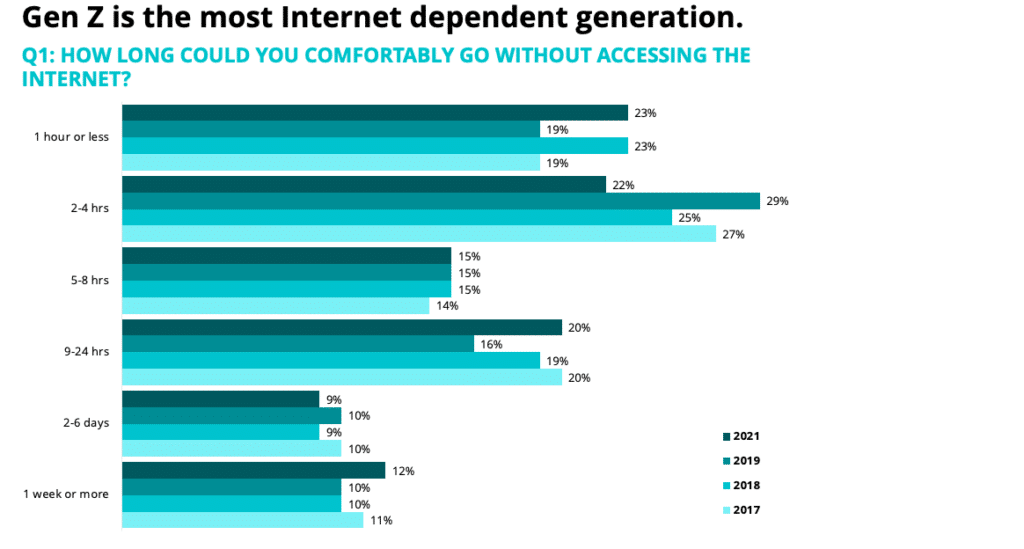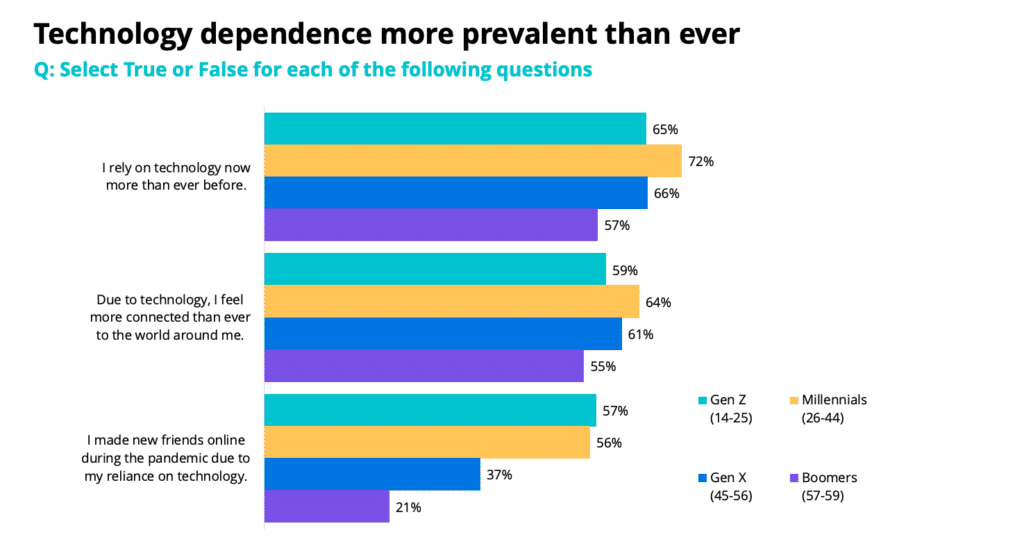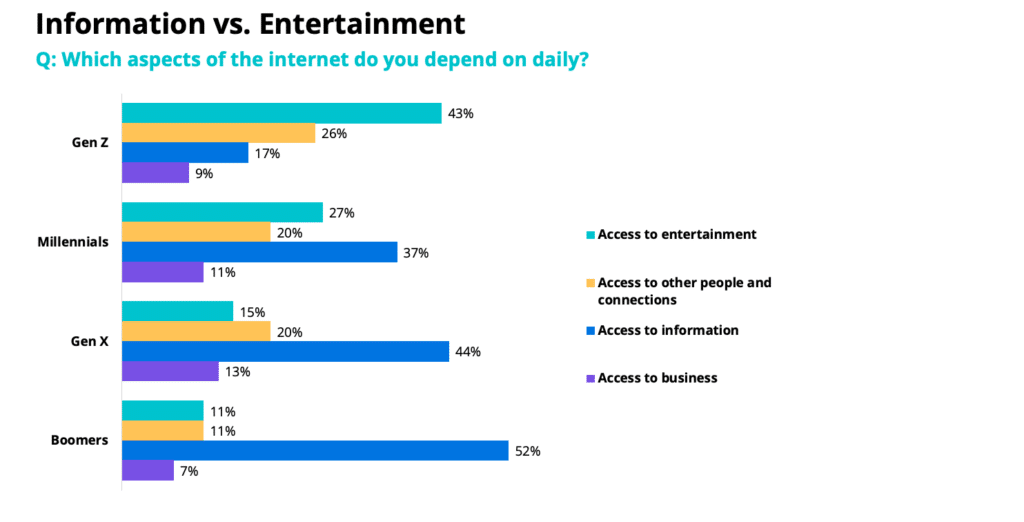

Generation Resilience: Connecting a Locked Down Generation
Lockdowns, quarantines, an always-online mentality. If there’s one thing that’s emerged as a prominent trend throughout the pandemic, digital channels have unquestionably played a larger role in all of our lives.
Today, it’s hard to imagine a business that doesn’t offer some type of online experience to its customers—it’s become the industry standard, for every industry.
But even as digital channels have served as a crucial source of connection during unimaginable disruption, web users remain divided by generation on what that connection looks like.
“Generational Resilience,” the fourth annual study commissioned by WP Engine and conducted by The Center for Generational Kinetics (CGK), examines new and prevailing expectations for digital held by different generations of web users.
The report, which provides insights into the evolving digital preferences of savvy online audiences and consumers across all generations, was crafted with marketers, strategists, and business leaders across every industry in mind.
By offering key insights into the identifying behaviors and preferences of all generations that are playing out in today’s digital landscape, we hope to arm you with actionable information that provides clarity in your technology decisions today and ultimately, guides your digital strategy for the future.
While this year’s research maintains a focus on younger generations such as Millennials and Gen Z, it also offers additional detail on the digital behaviors of other generations, including Baby Boomers and Gen Xers, for a wider look at the way every generation has responded to and changed alongside the Covid-19 pandemic.
Download the ebook or keep reading for a look at the full report
Resilience: Connecting a Locked Down Generation
Gen Z Remains the Most Internet Dependent Generation
Gen Z continues to represent the most internet-dependent generation, with more than a quarter of Gen Z respondents saying they could only make it an hour (or less) before wanting to use the internet. Meanwhile, Baby Boomers remain the largest cohort prepared to go a week or longer without it.

That said, nearly half (45%) of all respondents said they couldn’t go more than four hours without internet access before becoming uncomfortable. While that number is significant, it wasn’t dissimilar from years past—overall, web dependency has remained mostly stable.

One interesting nuance is the drop in respondents from 2020 to 2021 who cited two to four hours as the amount of time it would take them to become uncomfortably disconnected from the web. While some of those users seem to have upped their internet dependency, others have arguably curtailed it.
This could be explained in part by the overwhelming nature of digital proliferation throughout the pandemic. Zoom fatigue, endless email, and nonstop social media scrolling have undoubtedly left some web users, regardless of age, feeling burnt out.
Another interesting development brought on by the always-online nature of the pandemic is a growing awareness around the importance of “digital detoxing.” Likely more and more people, across all generations are learning how to forgo digital devices, at least temporarily, to let go of the stress that stems from constant connectivity.
A key takeaway here? Even though digital channels are more prevalent than ever, the audiences that populate them remain selective in how and where they spend their time. Businesses and brands should take note.
Technology is Now at the Center of Everything
Dependency on the internet, however, shouldn’t be confused with dependency on technology as a whole. Our research found that even though web dependency has remained stable throughout the pandemic, dependence on technology has dramatically increased for every generation.

One interesting nuance is the drop in respondents from 2020 to 2021 who cited two to four hours as the amount of time it would take them to become uncomfortably disconnected from the web. While some of those users seem to have upped their internet dependency, others have arguably curtailed it.
This could be explained in part by the overwhelming nature of digital proliferation throughout the pandemic. Zoom fatigue, endless email, and nonstop social media scrolling have undoubtedly left some web users, regardless of age, feeling burnt out.
Another interesting development brought on by the always-online nature of the pandemic is a growing awareness around the importance of “digital detoxing.” Likely more and more people, across all generations are learning how to forgo digital devices, at least temporarily, to let go of the stress that stems from constant connectivity.
A key takeaway here? Even though digital channels are more prevalent than ever, the audiences that populate them remain selective in how and where they spend their time. Businesses and brands should take note.
Dependency on the internet, however, shouldn’t be confused with dependency on technology as a whole. Our research found that even though web dependency has remained stable throughout the pandemic, dependence on technology has dramatically increased for every generation.

For Gen Z, video chat, remote learning, and gaming were among the most cited activities they experienced for the first time in 2020. For older generations like Gen X and Baby Boomers, telehealth and remote work were far more prevalent.
While those digital trends mirror many of the activities each generation was already engaged in pre-pandemic (and often in a physical setting), the online options that replaced them have experienced rapid adoption, with little sign of turning back.
Entertainment vs. Information: A Generational Split
Another digital trend that accelerated during the pandemic was video streaming, which was overwhelmingly led by Gen Z. 70% of Gen Z respondents said they increased their use of video streaming in 2020, aligning with their larger desire to be entertained, not informed when accessing the internet.
In line with our previous research, every generation except for Gen Z continues to look to the web for access to information. Gen Z bucks that trend, gravitating to the internet for entertainment more than anything else (Millennials come in second place with approximately half as much interest).

The Info vs. Entertainment dynamic remains a tricky one—should you target younger audiences with dynamic, entertaining content at the risk of alienating other generations? Our research suggests the answer is yes, as Gen Z and Millennials now make up 70% of online audiences.
Many businesses have approached this issue carefully, slowly weaving more engaging, entertaining content like video and social media into their digital footprints while remaining informative and even somewhat formal.
On the other hand, businesses have also bolstered their approaches by meeting younger audiences across the sources of entertainment they increasingly prefer.
TikTok, for example, which was already extremely popular among younger generations, grew 180% among Gen Z users in 2020. Other generations, who have joined Gen Z and Millennials in using services like Netflix and Hulu, helped boost streaming services above 1 billion subscriptions worldwide in 2020.
Entrenched Habits, Evolving Trends
Resilience was on display throughout the pandemic, both in the deepening digital habits of each generation, as well as the acceleration of digital trends and adoption that occurred as a result.
Digital channels unquestionably filled an immediate void in the face of closures and restrictions across the physical world. As those initial circumstances have translated into longer-term realities, digital habits and behaviors across all generations have gone from the reactive to the proactive, transitioning from resilience to a focus on rebuilding.
Read the full report to find out more!
Fuel the Freedom to Create With WP Engine
WP Engine powers the freedom to create on WordPress. The company’s products, the fastest among all WordPress providers, power 1.5 million digital experiences. More of the top 200,000 sites in the world use WP Engine to power their digital experiences than anyone else in WordPress.
About WP Engine
WP Engine, the WordPress technology company, provides the most relied upon and trusted brands and developer-centric WordPress products for companies and agencies of all sizes, including managed hosting for WordPress, enterprise WordPress hosting, headless WordPress, Flywheel, Local, and Genesis. WP Engine’s tech innovation and award-winning WordPress experts help to power more than 1.5 million sites across 150 countries.
